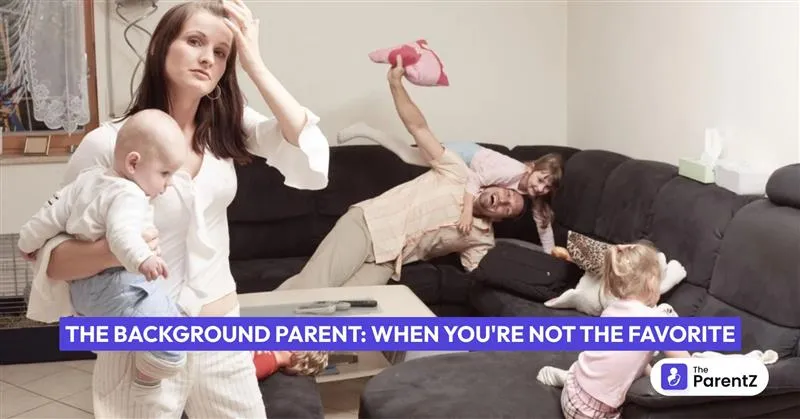When your child falls and gets hurt, who do they run to? When they have a nightmare at 2 AM, whose name do they call out? When they need help with homework or want to share exciting news, who gets the first hug?
If the answer isn't you, welcome to the quiet world of being the "background parent."
While everyone talks about the favorite parent, the primary caregiver, or the "default parent" who handles most of the daily responsibilities, there's another side to this story that rarely gets attention. There's the parent who sits in the shadows, watching from the sidelines, feeling like a supporting character in their own family's story.
The Invisible Struggle
From the outside, being the background parent might look like a dream setup. No midnight wake-up calls, no constant demands for snacks, no referee duties during sibling fights. It seems peaceful, even enviable. Other parents might think, "You're so lucky your kids don't bug you every five minutes," or "At least you get some time to yourself."
But here's what people don't see: the quiet ache of feeling unnecessary in your own home.
Being the background parent isn't always a choice. It's not about being lazy or uninvolved. Sometimes, despite every effort to connect, children naturally gravitate toward one parent for everything. Maybe it started when one parent handled more night feeds as a baby, or perhaps one parent's work schedule allowed them to be home more often. Whatever the reason, patterns form, and once they're established, they can feel impossible to break.
The Emotional Toll
The background parent often experiences a unique kind of loneliness. There's the hollow feeling when your child cries and pushes you away, wanting only the other parent. There's the sting of being the afterthought when family plans are made. There's the exhaustion of trying so hard to connect, only to feel like you're speaking a different language.
This position can trigger deep feelings of inadequacy. Questions like "What am I doing wrong?" or "Why don't my kids want me?" become constant companions. The background parent might start believing they're less important, less loved, or less capable as a parent.
Resentment can creep in too. Not necessarily toward the children, but sometimes toward the favorite parent who seems to effortlessly maintain that special bond. It can feel unfair when one parent gets all the sweet moments while the other feels like they're begging for scraps of attention.
How It Affects the Children
Children don't set out to hurt the background parent, but this dynamic can impact them, too. When kids rely on only one parent for everything, they miss out on different perspectives, approaches, and strengths that each parent brings. They might struggle more when the primary parent isn't available, or they might develop an unhealthy dependence on one person.
Children also absorb family dynamics more than we realize. They might sense the tension between parents or feel guilty about their preferences without understanding why. Sometimes, they even use this dynamic to their advantage, knowing exactly which parent will give them what they want.
Impact on Relationships
The background parent dynamic doesn't just affect the parent-child relationship. It can strain marriages and partnerships, too. The favorite parent might feel overwhelmed by being everyone's go-to person while simultaneously feeling protective of their special role. The background parent might feel isolated from their partner, creating distance in the relationship.
Social situations can become awkward, too. School events, parent gatherings, and family functions can highlight these dynamics. When other parents assume the favorite parent handles everything, or when teachers always call one parent first, it reinforces the background parent's sense of being secondary.
Signs You Might Be the Background Parent
Sometimes the realization creeps up slowly. Maybe you notice your child always asks for the other parent when they're upset. Perhaps you find yourself saying "go ask mom/dad" because you know they will anyway. You might realize you're rarely included in bedtime routines, or that your child doesn't share their day with you.
The background parent often becomes the disciplinarian by default, the one who handles the "unfun" parts of parenting while missing out on the bonding moments. You might find yourself working harder for the same affection that seems to come naturally to your partner.
The Path Forward
Being the background parent doesn't have to be permanent, but change takes patience and intentionality. Small, consistent efforts often work better than dramatic gestures. Maybe it starts with taking over one bedtime routine per week or finding a special activity that becomes "your thing" with each child.
The key is finding your unique way of connecting rather than trying to replicate what the other parent does. Maybe you're the parent who gives the best piggyback rides, tells the silliest jokes, or makes the most creative snacks. Every parent has something special to offer.
Communication with your partner is crucial. The favorite parent might not even realize the dynamic exists or understand how it affects you. Working together to create more balanced interactions can help everyone in the family.
Conclusion
Remember that parenting isn't about being the favorite. It's about being present, consistent, and loving in your own way. The background parent often provides stability, different perspectives, and unique strengths that children need, even if they don't always show appreciation for it.
Your worth as a parent isn't measured by who gets called for in the middle of the night or who receives the most hugs. Sometimes, the quiet, steady presence of the background parent becomes the foundation that allows the whole family to thrive.
Being the background parent is hard, and those feelings are valid. But it's not the end of the story. With time, patience, and intentional effort, every parent can find their place in their child's heart, not as the favorite, but as someone irreplaceable in their own special way.





Be the first one to comment on this story.